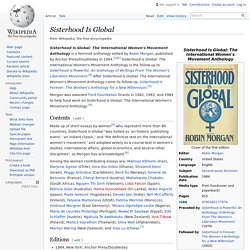

Pour un féminisme critique. D'accord.
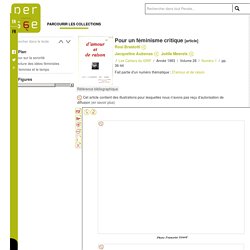
Mais le vécu, l'existentiel partent de tous les côtés. Comment les rassembler sans passer par le plus petit dénominateur commun cher aux politiques, ou une théorisation partielle, donc excluante, de certains de leurs éléments? Le féminisme comme « pensée » est handicapé par la richesse même de son terrain qui ne permet pas la théorisation rassurante et universelle. C'est peut être en cela qu'il est intéressant car il rend caduques tous les «ismes». U avance aussi lentement car il assume toujours, en même temps qu'il affirme, le poids de ses propres contradictions. Bien évidemment, ces trois «lignes», ou sens, du terme « féminisme » ne sont pas exclusives : elles se recoupent souvent dans les pratiques et les problématiques collectives et individuelles.
J'aime beaucoup cette idée de paroles plurielles, sans doute une des plus efficaces pour en finir avec la «race de femmes». (6) « Rue Nationale », p. 455 dans : Les femmes s'entêtent. (7) Cf. . (8) Op. cit., p. 33. Sororité - Féministes en tous genres. La sororité, cette bénédiction… Et cette pesante injonction. Quand on est féministe et qu’on milite, quels que soient les terrains concernés, on apprend peu à peu l’importance de la bienveillance entre femmes.
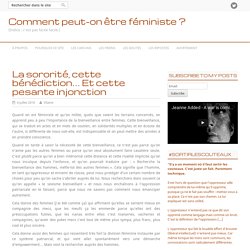
Cette bienveillance, qui se traduit en actes et en mots de soutien, en solidarités multiples et en écoute de l’autre, si différente de nous soit-elle, est indispensable et on peut mettre des années à en prendre conscience. Quand on tarde à saisir la nécessité de cette bienveillance, ce n’est pas parce qu’on n’aime pas les autres femmes ou parce qu’on veut absolument faire cavalière seule. Kathie Sarachild. Kathie Sarachild, born Kathie Amatniek in 1943, is an American feminist writer and campaigner.[1] In 1968 she took the last name Sarachild (after her mother Sara), coined the phrase "Sisterhood is Powerful" in a flier she wrote for the keynote speech she gave for New York Radical Women's first public action at the convocation of the Jeannette Rankin Brigade, was one of four women who held the Women's Liberation banner at the Miss America protest, and had her paper "A Program for Radical Feminist Consciousness-Raising" presented at the First National Women's Liberation Conference outside Chicago on November 27, 1968 (it was later published in Notes from the Second Year in 1970.)[2][3] She was a member of New York Radical Women.[3][3][4] In February 1969 she led Redstockings in their disruption of the New York State Abortion Reform Hearing, at which women first demanded to testify about their own abortions.)[2] Jump up ^ "Sarachild, Kathie".
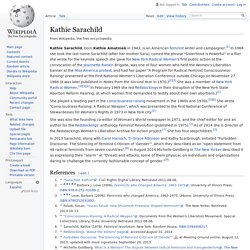
Civil Rights Digital Library. The Influential Feminist Anthology: Sisterhood Is Powerful. Sisterhood is Powerful: An Anthology of Writings from the Women’s Liberation Movement, published in 1970, gathered essays by many prominent feminists into one volume.
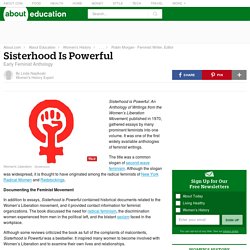
It was one of the first widely available anthologies of feminist writings. The title was a common slogan of second-wave feminism. Although the slogan was widespread, it is thought to have originated among the radical feminists of New York Radical Women and Redstockings. Documenting the Feminist Movement In addition to essays, Sisterhood is Powerful contained historical documents related to the Women’s Liberation movement, and it provided contact information for feminist organizations. Although some reviews criticized the book as full of the complaints of malcontents, Sisterhood is Powerful was a bestseller. Sisterhood is Powerful. Click here to skip to this page's main content.
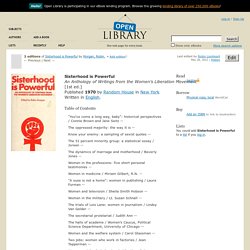
Hello! Open Library is participating in our eBook lending program. Browse the growing lending library of over 250,000 eBooks! Site Search Log in / Sign Up One web page for every book. No Permanent Waves: Recasting Histories of U.S. Feminism by Nancy A. Hewitt. Feminist Theory: From Margin to Center. Feminist Theory: From Margin to Center (1984; second edition 2000) is a book by bell hooks.[1] Her second book, it confirmed her importance as a leader in radical feminist thought.
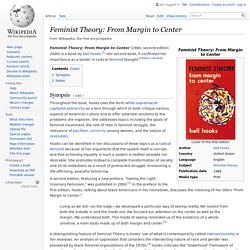
[citation needed] Synopsis[edit] Throughout the book, hooks uses the term white-supremacist capitalist patriarchy as a lens through which to both critique various aspects of American culture and to offer potential solutions to the problems she explores. She addresses topics including the goals of feminist movement, the role of men in feminist struggle, the relevance of pacifism, solidarity among women, and the nature of revolution. Hooks can be identified in her discussions of these topics as a radical feminist because of her arguments that the system itself is corrupt, and that achieving equality in such a system is neither possible nor desirable.
Living as we did—on the edge—we developed a particular way of seeing reality. Hooks also addresses several other issues relevant to feminism. Sisterhood Is Global. Sisterhood Is Global: The International Women's Movement Anthology is a feminist anthology edited by Robin Morgan, published by Anchor Press/Doubleday in 1984.[1][2] Sisterhood Is Global: The International Women's Movement Anthology is the follow up to Sisterhood is Powerful: An Anthology of Writings From The Women's Liberation Movement.[3] After Sisterhood Is Global: The International Women's Movement Anthology came its follow-up, Sisterhood Is Forever: The Women's Anthology for a New Millennium.[3] Morgan was awarded Ford Foundation Grants in 1982, 1983, and 1984 to help fund work on Sisterhood Is Global: The International Women's Movement Anthology.[4] Contents[edit] Editions[edit] 1984, New York: Anchor Press/Doubleday1985, London: Penguin Books1996, Feminist Press at The City University of New York, ISBN 978-1558611603.
